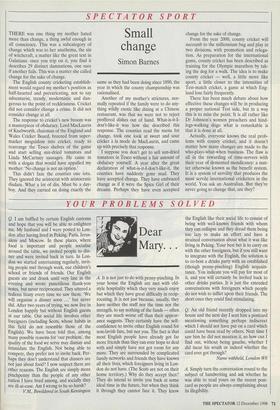SPECTATOR SPORT
Small change
Simon Barnes
THERE was one thing my mother hated more than change, a thing awful enough in all conscience. This was a subcategory of change which was to her anathema, the sin of witchcraft, a matter like the great text in Galatians: once you trip on it, you find it describes 29 distinct damnations, one sure if another fails. This was a matter she called change for the sake of change.
The English county cricketing establish- ment would regard my mother's position as half-hearted and prevaricating, not to say adventurist, trendy, modernistic and dan- gerous to the point of recklessness. Cricket did not consider change a crime. It did not consider change at all.
The response to cricket's new broom was a masterpiece of obduracy. Lord MacLaurin of Knebworth, chairman of the England and Wales Cricket Board, breezed from super- market moguldom into cricket, ready to rearrange the Tesco shelves of the game and start selling sun-dried tomatoes and Linda McCartney sausages. He came in with a slogan that would have appalled my mother: 'No change is not an option.'
This didn't faze the counties one iota. They ignored the aristocrat with aristocratic disdain. What a lot of din. Must be a day- boy. And they carried on doing exactly the same as they had been doing since 1890, the year in which the county championship was rationalised.
Another of my mother's strictures, nor- mally repeated if the family were to do any- thing wildly exotic like dining at a Chinese restaurant, was that we were not to reject proffered dishes out of hand. What-is-it-I- don't-like-it was how she described this response. The counties read the menu for change, took one look at sweet and sour cricket a la mode de MacLaurin, and came up with precisely that response.
I suppose you don't get to sell sun-dried tomatoes in Tesco without a fair amount of obduracy yourself. A year after the great declaration of what-is-it-I-don't-like-it, the counties have suddenly gone mad. They have accepted change. They have embraced change as if it were the Spice Girl of their dreams. Perhaps they have even accepted change for the sake of change.
From the year 2000, county cricket will succumb to the millennium bug and play in two divisions, with promotion and relega- tion. As preparation for the international game, county cricket has been described as training for the Olympic marathon by tak- ing the dog for a walk. The idea is to make county cricket — well, a little more like sport, a little closer to the intensities of Test-match cricket, a game at which Eng- land lose fairly frequently.
There has been much debate about how effective these changes will be in producing a proper national Test side, but in a way this is to miss the point. It is all rather like Dr Johnson's women preachers and hind- legs-walking dogs: what is remarkable is that it is done at all.
Actually, everyone knows the real prob- lems with county cricket, and it doesn't matter how many changes are made to the who-plays-what-when business. The flaw is all in the rewarding of time-servers with their year of demented mendicancy: a mat- ter otherwise known as the benefit system. It is a system of servility that produces the most servile international cricketers in the world. You ask an Australian. But they're never going to change that, are they?










































































 Previous page
Previous page